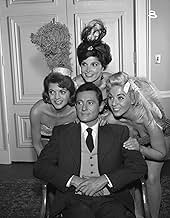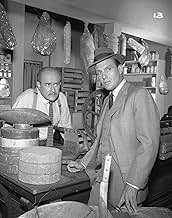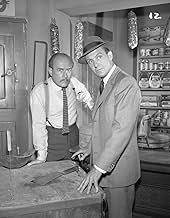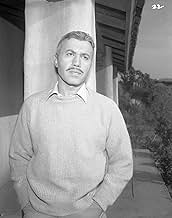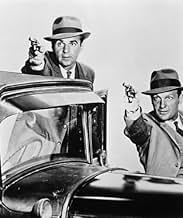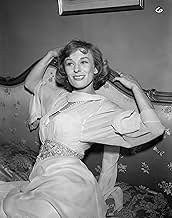Ajouter une intrigue dans votre langueSpecial Agent Eliot Ness and his elite team of incorruptable agents battle organized crime in 1930s Chicago.Special Agent Eliot Ness and his elite team of incorruptable agents battle organized crime in 1930s Chicago.Special Agent Eliot Ness and his elite team of incorruptable agents battle organized crime in 1930s Chicago.
- Récompensé par 2 Primetime Emmys
- 4 victoires et 7 nominations au total
Parcourir les épisodes
Avis à la une
I use to watch the Untouchables every thursday nite, never missed a series ever. I still remember the comericals CHILDS double edge razor blades, Chesterfield cigarettes.
Every time I watch it from one of my VHS tapes I long for the series to come back on TV.
Bet you didn't know that a lot of the guest appeared on THE Adventures of SUPERMAN, also on LASSIE, and a few on GUN SMOKE. Which was no surprise sense THE UNTOUCHABLES was a Desilu Production.
To sum it up if you haven't seen THE UNTOUCHABLES the TV series of the 50's, You haven't lived until you do.I hope someday to have all of the series to watch.
Sencer Thanks James
Every time I watch it from one of my VHS tapes I long for the series to come back on TV.
Bet you didn't know that a lot of the guest appeared on THE Adventures of SUPERMAN, also on LASSIE, and a few on GUN SMOKE. Which was no surprise sense THE UNTOUCHABLES was a Desilu Production.
To sum it up if you haven't seen THE UNTOUCHABLES the TV series of the 50's, You haven't lived until you do.I hope someday to have all of the series to watch.
Sencer Thanks James
I had never heard of "The Untouchables" TV show until one morning
my 8th grade English teacher, Mr. Schmidt started ranting about the
graphic violence depicted in movies and on television shows such as
"The Untouchables" and what was he world coming to? From the next
broadcast, I was an avid fan. Much as in the style of the James Cagney
classic of 1933, "Public Enemy," "The Untouchables" wove a web of
mysterious gangland horror by NOT showing the graphic violence but by
instead keeping the killing in the shadows. The creators of the series
never forgot that there is nothing you can show in theater that can
measure up to the imagination of the audience. Another mysterious dimension to the series is, like "The Alfred
Hitchcock Show", "The Untouchables" had an uncanny knack of featuring
actors who would later become stars or at least very well known faces
in movies and on television. After 4 years in the air force including
a year in Vietnam, I watched the series as daily re-runs during the
summer of 1971 just before going to university in Tokyo. One episode
had Telly Savalas as an up and coming bookkeeper with The Mob run by
Frank Nitty while Al Capone was in prison. That evening other business
pulled me away from the television set and I figured I'd see the second
half of the show some other time. Because I have been in Japan ever
since, I never did find out whatever happened to the character played
by Telly Savalas. Less than two years later, however, Telly Savalas
finally made it big in television as Kojak.
my 8th grade English teacher, Mr. Schmidt started ranting about the
graphic violence depicted in movies and on television shows such as
"The Untouchables" and what was he world coming to? From the next
broadcast, I was an avid fan. Much as in the style of the James Cagney
classic of 1933, "Public Enemy," "The Untouchables" wove a web of
mysterious gangland horror by NOT showing the graphic violence but by
instead keeping the killing in the shadows. The creators of the series
never forgot that there is nothing you can show in theater that can
measure up to the imagination of the audience. Another mysterious dimension to the series is, like "The Alfred
Hitchcock Show", "The Untouchables" had an uncanny knack of featuring
actors who would later become stars or at least very well known faces
in movies and on television. After 4 years in the air force including
a year in Vietnam, I watched the series as daily re-runs during the
summer of 1971 just before going to university in Tokyo. One episode
had Telly Savalas as an up and coming bookkeeper with The Mob run by
Frank Nitty while Al Capone was in prison. That evening other business
pulled me away from the television set and I figured I'd see the second
half of the show some other time. Because I have been in Japan ever
since, I never did find out whatever happened to the character played
by Telly Savalas. Less than two years later, however, Telly Savalas
finally made it big in television as Kojak.
Seeing an excerpt from 'Untouchables' on satellite TV recently brought back some memories of forty years ago, when I looked forward in eager anticipation to seeing the weekly appearance of Eliot Ness and his associates. To see them again was to see characters apparently frozen in time, operating in a mythical world where the differences between good and evil were clearly delineated and the 'bad guys' got their just deserts. Notwithstanding the fact that Capone and Ness never met, that Ness had little, if anything, to do with putting Capone behind bars, the programmes were quite well directed and acted, even though some of the supporting characters had little,if anything, to say - I can remember often waiting for some considerable time for 'Rico' (Georgiade)to say his only line ! Enjoyable,nevertheless, as cinematic curiosities, well crafted, but so far removed from historical reality as to be a rather threadbare tapestry of the events which the series purported to represent.
I must differ only slightly from the praise of one who precedes me, but yes, it was a cracking good show! When a local station ran the series in syndication at midnight in 1967, I turned into an insomniac.
Part of it was my youth; part was/is the b&w presentation giving it a brooding, "gritty" (pardon the cliche) flavour; part was the musical score. Frankly, I found it much superior to the colour and more mature (?) series recently under the same title. Possibly the early '60s series had the elements of a morality play that move some part of me that the more ambiguous -- and in places historically accurate -- new UNTOUCHABLES can not.
One thing bothers me, however, although I fully understand that in the television productions of forty years ago one had to be discrete. It concerns the depictions of violence. I do not object (within reason) to violence per se, but THE UNTOUCHABLES showed a lot of it without the horror. With a more jaundiced eye of the 1990s, when on very rare occasions I have been able to see an old time episode, I am struck by the trivialisation of violent scenes. Even the point-blank firearms shots are comically muted, and there is never a hint of flying blood.
That said, however, I consider the advent of THE UNTOUCHABLES and BONANZA in the 1959-60 season as the beginning of the REAL "golden age of television" in the United States.
Post scriptum: I am sure there were a couple of spin-off "made for TV" movies in the 1960s from the series. Of that I know nothing more save the title of one of them: THE GUN OF ZANGARA.
Part of it was my youth; part was/is the b&w presentation giving it a brooding, "gritty" (pardon the cliche) flavour; part was the musical score. Frankly, I found it much superior to the colour and more mature (?) series recently under the same title. Possibly the early '60s series had the elements of a morality play that move some part of me that the more ambiguous -- and in places historically accurate -- new UNTOUCHABLES can not.
One thing bothers me, however, although I fully understand that in the television productions of forty years ago one had to be discrete. It concerns the depictions of violence. I do not object (within reason) to violence per se, but THE UNTOUCHABLES showed a lot of it without the horror. With a more jaundiced eye of the 1990s, when on very rare occasions I have been able to see an old time episode, I am struck by the trivialisation of violent scenes. Even the point-blank firearms shots are comically muted, and there is never a hint of flying blood.
That said, however, I consider the advent of THE UNTOUCHABLES and BONANZA in the 1959-60 season as the beginning of the REAL "golden age of television" in the United States.
Post scriptum: I am sure there were a couple of spin-off "made for TV" movies in the 1960s from the series. Of that I know nothing more save the title of one of them: THE GUN OF ZANGARA.
I bought the first series of DVDs yesterday and until then, I never knew there was a two-hour pilot movie about it. I always thought Robert Stack was a better Eliot Ness than Kevin Costner. Stack's Ness was more like a tough, no-nonsense federal agent while Kevin Costner played him more like a nerdy accountant. This used to be my dad's favorite show and, on nights when I didn't have school the next day, he would let me stay up and watch it with him. When I was in college, I caught it when it was in syndication. I hope they continue to put out these DVDs until they have the whole series out. I'm really looking forward to it.
Life sure was simple back when this series first aired. You rooted for the good guys and hissed at the bad guys and you were glad, in the end, to see Capone and his cohorts get what was coming to them. It also shows that we have to be ever vigilant with our government officials so that this kind of evil cannot permeate our society. Great action-packed series and now lives forever in the DVD format. Now, if only THE FUGITIVE would come out on DVD.
Life sure was simple back when this series first aired. You rooted for the good guys and hissed at the bad guys and you were glad, in the end, to see Capone and his cohorts get what was coming to them. It also shows that we have to be ever vigilant with our government officials so that this kind of evil cannot permeate our society. Great action-packed series and now lives forever in the DVD format. Now, if only THE FUGITIVE would come out on DVD.
Le saviez-vous
- AnecdotesWalter Winchell received a reported $25,000 per episode for his narration on this series. With his signature machine gun dialogue delivery, he could apparently rack up almost 200 words per minute.
- GaffesThe opening credits for the fourth season show a book open to a page that reads "The Untouchables, 1929--1933". This contradicts the chronology of several episodes set in 1934 or 1935.
- Citations
Police Officer: There is nothing in that area... except an old abandoned warehouse.
- ConnexionsEdited into Le tueur de Chicago (1959)
Meilleurs choix
Connectez-vous pour évaluer et suivre la liste de favoris afin de recevoir des recommandations personnalisées
- How many seasons does The Untouchables have?Alimenté par Alexa
Détails
- Date de sortie
- Pays d’origine
- Langue
- Aussi connu sous le nom de
- The Untouchables
- Lieux de tournage
- Sociétés de production
- Voir plus de crédits d'entreprise sur IMDbPro
- Durée
- 50min
- Couleur
- Mixage
- Rapport de forme
- 4:3
Contribuer à cette page
Suggérer une modification ou ajouter du contenu manquant


